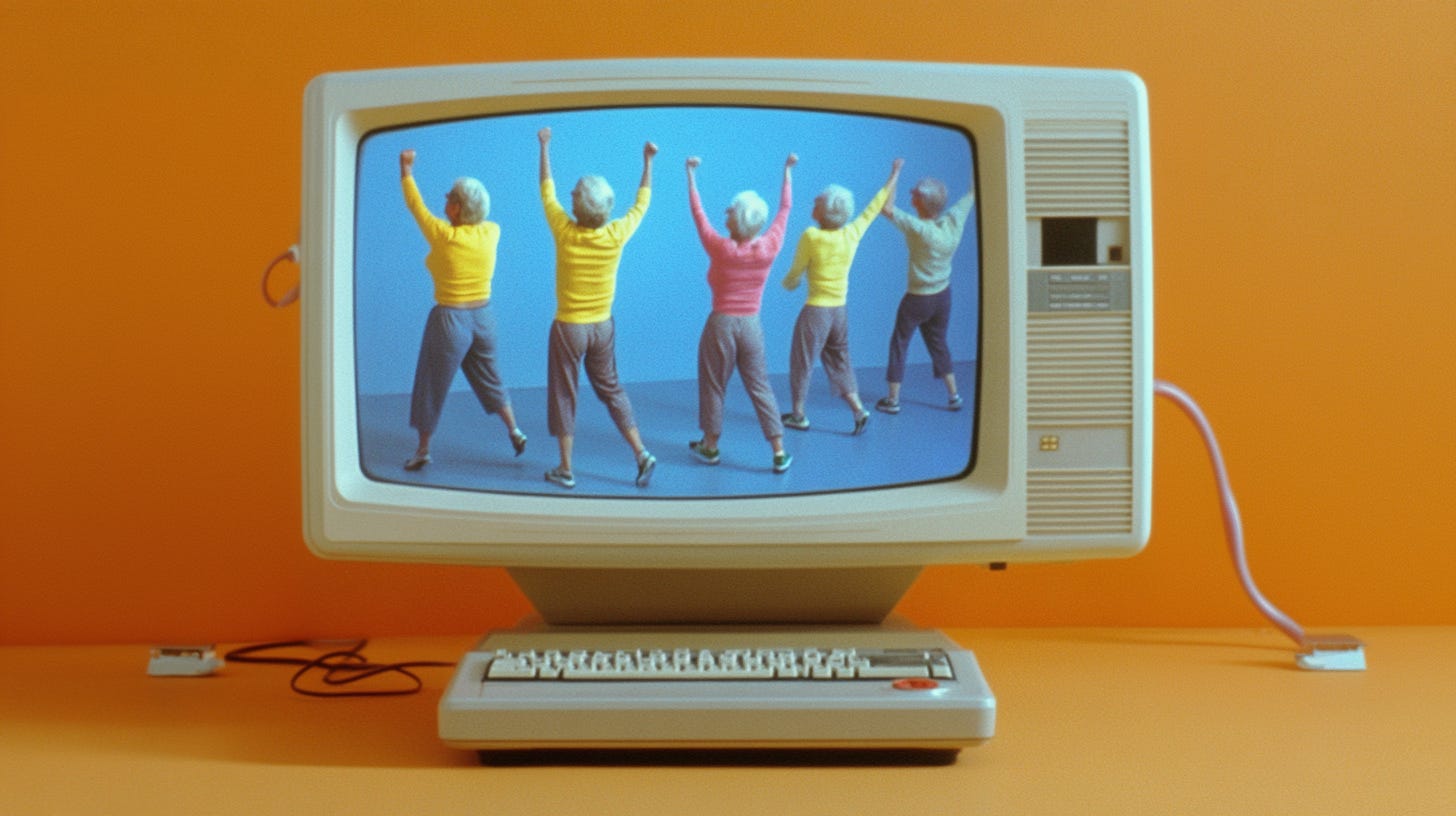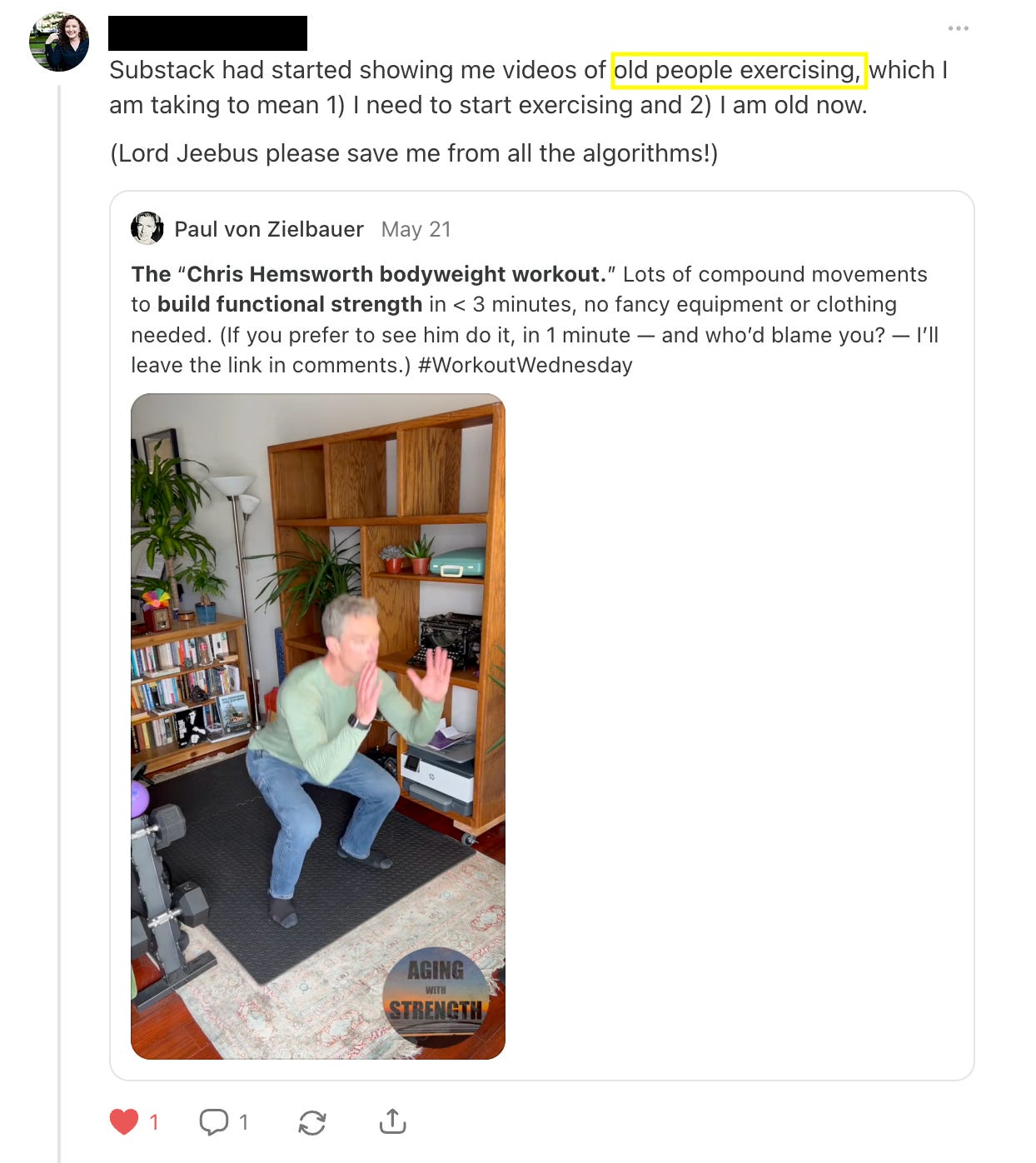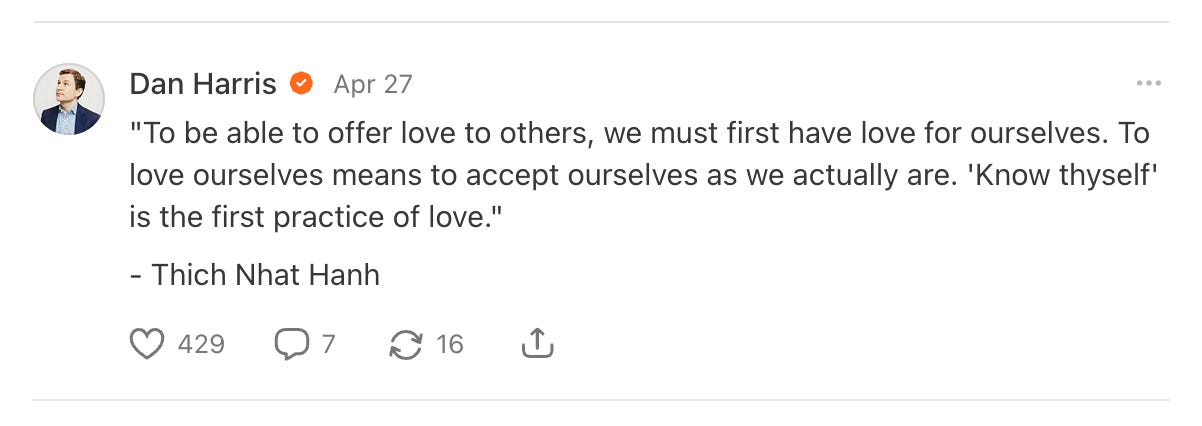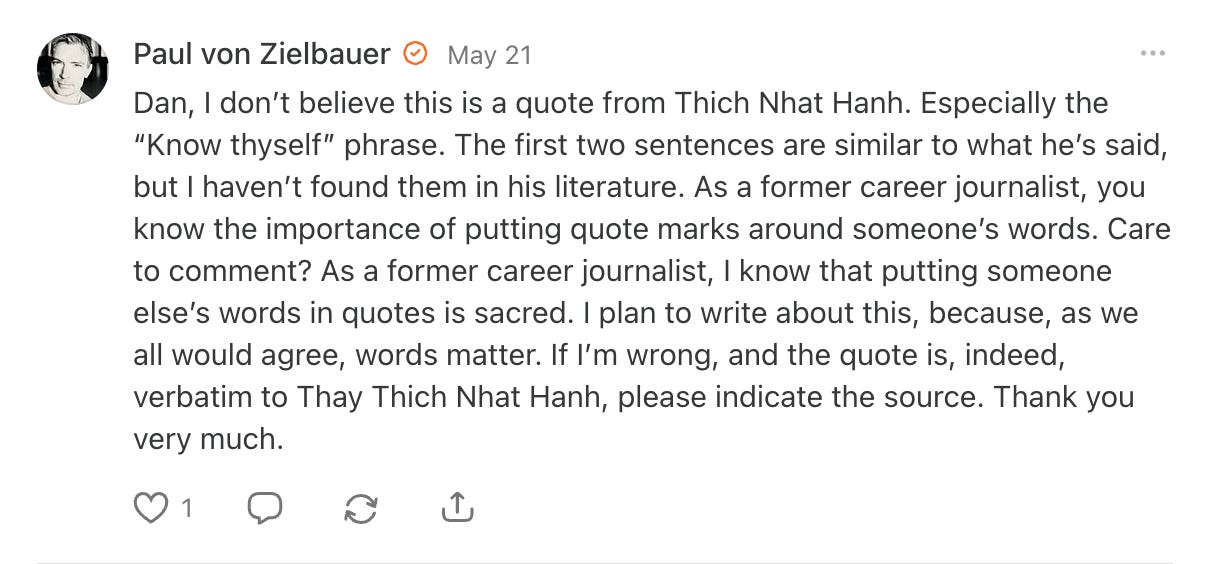I got called old on the internet & other notes
Dan Harris misquotes Thich Nhat Hanh. "Super ager" traits. The 'NHL playoffs' lesson.
I’m covering several topics today. Each of them connect to aging with strength in one or more of its many forms (physical, cognitive, emotional, nutritional, spiritual & community):
I got called old on the internet. Which was educational but also, “Ouch.”
Dan Harris, the relentlessly mercantile meditation guru, misquoted a world-renowned Buddhist monk: Why that shouldn’t go unexamined.
The notion of “super agers” and the importance of maintaining a vital purpose to reach 95 in good health and high spirits.
What an NHL playoff game last week indirectly revealed about the best way to age like a champion.
But first, in cased you missed it:
1 | “Old people exercising” and other epiphanies
A couple months ago, I began posting weekly 3-minute #WorkoutWednesday videos to Substack Notes (you can find them all in one place here), to encourage people to move their bodies a few minutes at a time, no gym or special equipment required.
Last week’s note, in which I completed a Chris Hemsworth plyometric workout I’d seen on Instagram a couple years ago, caught an algorithmic updraft and racked up thousands of views, comments and restacks. Gratifying to see, because I never know what exactly to expect from even the more neighborly corners of the internet like Substack.
A few days later, I got a notification of yet another restack:
“Old people exercising.” First off, it’s a fair and accurate comment, I guess, and not meant with malice as much as indignation at the Substack algo. But it felt like a body blow. Why it did is interesting and instructive. Empirically, it’s a fact: I’m 58 and, thus, have crossed the blurry line from younger middle age — at around age 53 or so — to older middle age. I never think of myself as old (it helps to have a nine-year-old daughter) or carry myself as old. (Unless I do and just don’t know it.)
That I’ll be 60 in two years blows my mind.
And that’s why “old people exercising” isn’t without teeth. It’s like the cassette-tape insult Michael Keaton’s character replays over and over while pouting inside a mortuary cabinet in the signature scene from “Night Shift,” a 1982 comedy with Henry Winkler. (Referencing a 43-year-old movie doesn’t make me old. Does it?)
For the record, that one “like” that this younger woman’s comment received is from me.
2 | Misquoting a Buddhist icon & why it matters (to me)
Last month, Dan Harris, the former ABC News correspondent who now leads a robust if relentless meditation and wellness business, posted a quotation that he attributed to Thich Nhat Hanh, a highly influential, globally revered Buddhist monk:
Unfortunately, the quotation doesn’t appear to be authentic.
I’ll explain how I came to that conclusion, how I attempted to verify it — with both Harris and Thich Nhat Hanh’s longtime book publisher — and why I’m writing about it here.
Upon first seeing Harris’s note on Substack, I was stoked to discover the quotation. I intended to use it to anchor a post I was writing on the importance of self-forgiveness. Only after I’d already pasted it into my draft did I realize that, as a former full-time reporter myself, I needed to verify it. A perfunctory but necessary act of journalism.
To my surprise, I couldn’t find that quote anywhere. Though quite similar to Thich Nhat Hanh’s published writings, these three sentences in quotation marks weren’t anywhere online, other than on Harris’s Substack, his X account and his Instagram.
Tracking down a monk’s words
I emailed the folks at DanHarris.com asking for the source of the quote, and someone generously wrote back, “We are not sure the exact original source, Dan probably heard it anecdotally but claims that the quote is widely attributed to Thich Nhat Hanh.”
I emailed the publisher of Parallax Press, the primary publisher of Thich Nhat Hanh's books, three times to ask her help in tracking down the quote but received no reply.
I also turned to AI. All four (paid versions of) AI applications I asked — Claude, Gemini, Perplexity and ChatGPT — conspicuously returned the same result: The quote sounds a lot like Thich Nhat Hanh, but Harris’s quote isn’t found in his published writing.
ChatGPT went even further, noting the phrase “Know thyself” is
“a Socratic/Western formulation, while Thích Nhất Hạnh’s language leans Buddhist and typically avoids that framing”
ChatGPT said Harris’s quote “is a good paraphrase of his philosophy, but as a direct quote, no, it doesn’t appear to be authentically his. Likely a conflation of his themes with more Western self-help wording.”
Ouch.
AI gets things wrong, all the time. When all four of the top consumer AI applications report the same findings, though, it’s often for a reason. I reached out to Harris directly, in a comment under his Substack note with the quote, asking for the source.
As of this writing, I haven’t seen a response from Harris.
Why this matters
So, what’s wrong with a paraphrase? If the quote captures the spirit of the message, who cares if Harris drafts off Thich Nhat Hanh’s words, three years after he died, at age 95, without more care and rigor?
I care; watering down someone else’s thoughts isn’t right. A rather selfless man whose words mattered to so many millions of people shouldn’t have them imprecisely used for personal gain by an internet entrepreneur who, as a former big-media reporter, understands the gravity of putting quotation marks around other people’s words.
Quotations are either verbatim or not at all. You don’t publish them second hand.
This is where it becomes personal for me, as someone who’s committed to exploring spiritual strength as a crucial pillar of aging. If I overlook Harris’s misquoting Thich Nhat Hanh, whether intentionally or otherwise, what standard am I setting for myself as a journalist, writer and father (not to mention for “old people exercising” on the internet)?
Spiritual strength requires fidelity to how words and ideas are assembled. If you’re cutting that corner, what others are you also cutting?
3 | The characteristic common to most “super agers”
Last week, I interviewed Dr. Eric Topol, a cardiologist and globally recognized authority on longevity medicine and research, about his new book, “Super Agers.”
The book opens with a simple discovery: In examining 1,400 people 80 years or older who had never had a chronic disease, Dr. Topol discovered the common thread among them all wasn’t exercise, diet or their DNA, but rather a combination of maintaining strong immune systems and being “remarkably upbeat” and full of purpose. “Some were still smoking cigarettes — up to two packs a day,” Topol writes, but, tellingly, most of the super agers “were so busy it was hard to get an appointment to get them enrolled” in the study.
If that’s not as close to a clinical endorsement for maintaining a curious, active and purpose-driven life into your 80s and 90s, I’m not sure what is. To hear more from the author himself, check out this interview of Dr. Topol by Sanjay Gupta, CNN’s chief medical correspondent.
I found it enlightening, even after reading the book. If you want to understand where medical science and AI are taking longevity medicine, and what you should consider doing to determine your personal disease risk factors, “Super Agers” is a must read.
I’ll do an entire post about about the book, and my exhaustive in-person interview with Dr. Topol, in an upcoming post.
4 | An NHL playoff game unveils a powerful aging strategy
Related to longevity habits in “Super Agers” and my conversation with Dr. Topol:
Last week, in the National Hockey League’s Eastern Conference Finals, the Carolina Hurricanes lost their third straight game to the Florida Panthers in a 6-2 beatdown — figuratively and literally. Once Game 3 was in hand, the captain for Florida, the reigning Stanley Cup champion, went after one of Carolina’s star players who had hit a Florida player in the previous game, injuring him. That’s not notable.
The remarkable part is what Carolina players did in response to that physical provocation: nothing. As their star scorer was being pushed around and mauled on the ice — in Carolina’s home rink — not a single Carolina teammate dove into the scrum, as is the customary response throughout the NHL.
In the post-game show, one commentator, a former NHL player, excoriated Carolina’s team culture for the failure to stick up for one of their own. The commentator essentially said that if players aren’t united against an opponent, the team can’t win a championship.
Are your players all working toward the same goal?
That’s when the analogy to aging with strength hit me: We can be great at individual pillars of longevity — physical strength or nutrition or emotional resilience or intellectual curiosity or spiritual connection or human relationships — but until we align most or all of these “players” into an cohesive plan, we’re not fully set up to win a championship.
By which I mean reach 85, 90 or 95 years old in good health and spirit. More on each of these pillars in upcoming posts.









Words do matter . Thanks for a wonderful read
From an "old person" to another, love this post.